“I am not reading my own lines,” she said, quietly; “I am learning from them, however!”
Then she rose with dignity and passed to another table where a broad, flat, commonplace hand lay ready.
“Well?” Mrs. Tweksbury pounced into the arena like a released gladiator. “What do you make of it, Ken?”
Raymond laughed. He saw that Mrs. Tweksbury was more impressed than she cared to acknowledge.
“I don’t know what she told you, Aunt Emily,” he said, taking up the check beside his plate, “but it was rather cleverly concealed rot, as far as I am concerned. Drivel; faddy drivel, but the girl’s a lady, or whatever that word stands for. I half believe the child takes herself seriously—she has wonderful eyes. She should wear blinders—it isn’t fair to leave them outside the veil. Comical little beggar!”
“But, Ken,” Emily Tweksbury followed her companion from the room, “you are like that—you really are! You just take life by the throat and you are sure of yourself in a way that frightens me.”
“Oh, come, Aunt Emily, that girl has caught you by her nonsense. See here, let us do a bit of sleuthing! I bet the sibyl often is at dinners where we go—and I’m not so sure but what I would know those hands of hers anywhere—they were not ordinary hands. Two can play at her little game.”
This seemed to offer some inducement to Mrs. Tweksbury and she brightened.
“Her walk, too, Ken. Did you notice that?”
“Yes—I did, by Jove! Longer strides than most girls take and a swing from the hips like a graceful dance motion. Yes, that walk should be a dead give-away.”
“And her eyes, Ken, she has eyes!”
“Yes,” rather musingly, “she has eyes!”
“Ken, we mustn’t give further countenance to this silly, faddy place.”
This with conviction.
“Why should we, Aunt Emily? I only went at your request, you know.”
“Of course. The girl got on my nerves.” Mrs. Tweksbury could smile now.
“Well, I’m going to get on hers!” Raymond set his jaw.
Two days later Kenneth Raymond went to the Brier Bush again for luncheon. This time Mrs. Tweksbury did not accompany him.
He took a table at the far end of the room near the windows—he wanted light. He ordered his luncheon, read his paper, and to all intents and purposes gave the impression of a business man who, having discovered a place of good food, repaired to it with confidence. Of course Elspeth Gordon did not remember him—why should she? But Joan did—and why should she? She was reading the palms of a hilarious group near the table at which Raymond sat reading the stock reports; she was in a gale of high spirits but, when she was aware of Raymond’s glance, she paused and caught her breath.
“Anything bad in my hand?” asked the girl whose palm Joan was scanning.
“Oh, no! Something splendid. You are never to make mistakes, because your caution is stronger than your desire,” Joan murmured.




